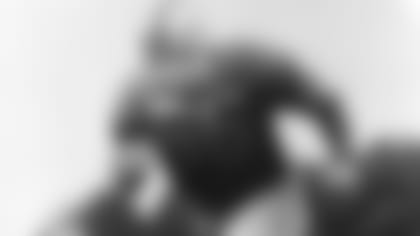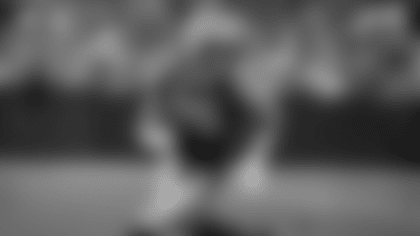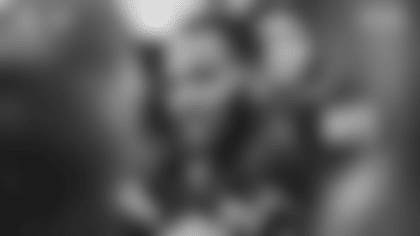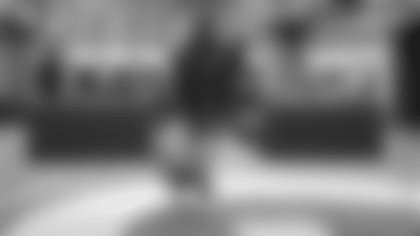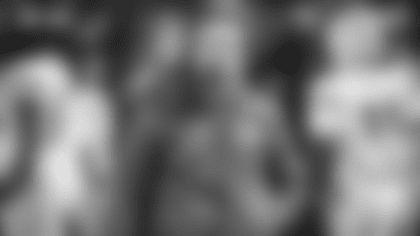Nicknamed "Little Bull," Deral Teteak played linebacker for the Packers from 1952 to 1956 and was inducted into the Packers Hall of Fame in 1987. A native of Oconto, Wis., Teteak played at Oshkosh High School before gaining fame as a member of the University of Wisconsin's famous "Hard Rocks" defense. The Packers drafted him in the ninth round in 1952. Teteak has been credited with being their first middle linebacker, but during his first two seasons, he played the middle behind a middle guard in mostly a 5-3-3 alignment.
On playing at old City Stadium behind Green Bay East High School:"I'll tell you what, the locker room was terrible. Coming from Wisconsin, then going in that locker room, it was like: 'What the (heck) is this?' It was like my high school. Well, it was a high school (stadium). Small lockers. The showers were awful. There were no meeting rooms. It was a run-down deal. They had a training room about as big as a bathroom. If you had two people in there, the third one had to wait his turn. But no matter if it rained or anything, the field was always good at East Stadium."
On the game-day atmosphere at City Stadium:"I kind of enjoyed the Lumberjack Band. They were kind of hokey-folky, but it was Green Bay. Green Bay had that Lumberjack Band for how many years?"
On the City Stadium fans:"In those days, the fans were in their fur coats, gloves and hats, high heels and boots. It wasn't like it is today."
On his salaries: "I was drafted in 1952 and signed a one-year contract with a $5,000 salary and no bonus money. After my rookie year I went to the Pro Bowl. The next year, they didn't want to increase my salary. Then they decided they'd give me $6,000, but I'd have to sign a two-year contract. So I got 6 and the next year, $6,500. After those two years, I went to $7,000 and $7,500. Those were my five years."
On Gene Ronzani, his first head coach:"To me, he wasn't a head coach. Good thing he had some assistants around. I didn't think he knew anything about football. Or maybe he did and he didn't know how to convey it. I don't know how the (heck) he got the job. He couldn't give a speech. He wouldn't look you in the eye. He just seemed like a funny kind of guy to me. I don't think the players respected him. At least, I didn't."
On Ronzani's playbook: "If you had a playbook and you were a center that was all you got. He wouldn't tell you what the guards and tackles were doing. The only book he gave you was what you did, but not what anybody else did. Like I was a middle linebacker, that's all I had. I didn't know what the other guys were doing. To be a good defense, you need to know what everybody is doing."
On whether Ronzani was much of a motivator:"No. He wasn't a guy who would get you fired up. You had to do that yourself. Ronzani wasn't a real in-charge guy. That was my thinking."
On Ronzani running a shotgun offense before it was in vogue or before anyone else was really running it:"It was crazy. We used the shotgun with Tobin Rote. Rote was a great runner. The (darn) thing worked. (Ronzani) was the head man so maybe he had something to do with it."
On Ronzani getting fired with two games remaining in the 1953 season and Hugh Devore and Scooter McLean taking over as interim co-head coaches:"It didn't work out. We got the (crap) kicked out of us by both teams (San Francisco and Los Angeles). You didn't know what the heck was going on. They fire Ronzani. Now, you got these two guys. It was like: 'Let's get the season over and get the (heck) out of here and find out who is going to be the coach next year.'"
On training camp being held in Grand Rapids, Minn., located in northern Minnesota more than 400 miles from Green Bay: "They bused us up there. No cars at all. If they didn't have a school bus there, we couldn't have gone downtown and had a beer. Without the bus, we couldn't go anywhere. We were just hung up there. We could play cards and that was about it."
On practicing in a former cow pasture at the North Central School of Agriculture:"The funniest thing was we were about halfway through practice one day – that was when Ronzani was the coach – and he was gone. 'Where the (heck) did he go?' All of a sudden he comes by in a car, gets out and says, 'Have a good day. I'm going fishing.' And he left and went fishing. The assistants ran practice."
On any other memories of the agricultural school: "There were animals around there."
On training camp when it was held in Stevens Point at what is now the University of Wisconsin-Stevens Point: "That was a lot better than (Grand Rapids). We stayed at the dormitories. Then we could walk and have a beer."
On his memories of the camps at Stevens Point during his last three seasons: "Very wild. We drank a lot. Every night we'd go to the tavern and drink beer."
On the train rides to the West Coast for the final two games of the season: "Three days and two nights. We were way in the back end (of the train). If we played San Francisco, we went to the north. If we went to Los Angeles, we took the southern railroad. Nobody could come through (the Packer cars). We'd sleep and play cards. We played more poker than you could believe. That's all we did."
On Rote and Babe Parilli splitting quarterback duties in 1952 and '53 and whether players took sides: "To me, Rote was more interested in his statistics. That was the first thing he'd do after the game. He wanted to know how he did. I think that was a little problem. Parilli was a good guy. He was a team player."
On Rote's physical ability: "He could run. He could play today. He was big enough. He had a very strong arm. The only problem I had with him was that he was more interested in what he did than the team."
On the Packers trading Parilli for quarterback Bobby Garrett, the No. 1 pick in the 1954 draft, as part of a six-player trade with Cleveland before Garrett played a down for the Browns:"(Garrett) would start stuttering in the huddle. One of the players would hit him on the back so he'd stop stuttering and could call the plays. Can you believe that? Why they got him? As I recall, to me, he was an average or less than average quarterback."
On whether he thought Bart Starr would make it big when he saw him in his first training camp in 1956:"No. When he first came there, he was a different kind of guy. He was all by himself. He wasn't with the other players at all. I didn't think he'd ever play. I was with him only one year, but I never thought he'd do anything. I didn't even think he had a strong arm."
On playing in the Pro Bowl following his rookie year: "Before the last game, Ronzani told me, 'You play a good game this week against the 49ers, you're going to the Pro Bowl.' I imagine they had to have it in before (the last game). My first day at the Pro Bowl was the day after the Rose Bowl that the Badgers played in. We played in the Coliseum. They were staying at the same hotel and they were getting on the bus to leave when I got there."
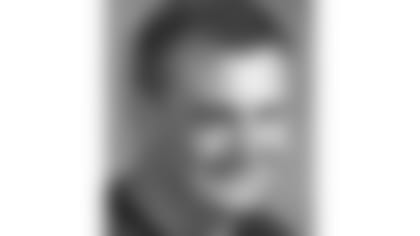
On defensive end Abner Wimberly, the Packers' other Pro Bowl defensive player that year:"Very good. He played all downs. Tough guy."
On defensive end John Martinkovic, who was selected to the Pro Bowl three straight years from 1953 to 1956: "Very good defensive end. He was a good run stopper and a fair pass rusher. He could move fairly well."
On the defensive alignments and his role during his five seasons: "My first year, we played with Ray Bray at middle guard. That was a 5-3. We played that one year and then we tried a lot of different things the next year. In '54, we went to (the 4-3) after Ronzani left. I liked that better. I remember in the '53' defense, I had to move out over the tight end. When you moved out in the '53,' you really went into the old Eagle Defense because you had no middle linebacker."
On fellow linebacker Roger Zatkoff, who was selected to the Pro Bowl three straight years from 1954 to 1956: "Roger was a wild guy. His motor was going 100 miles an hour all the time. A good player. Strong. He was wild on the field. Off the field, I don't even think he'd drink anything. He was just wild: A sideline-to-sideline guy."
On the much ballyhooed matchups between Packers fullback Howie Ferguson, who didn't go to college, and Baltimore Colts fullback Alan Ameche, the Heisman Trophy winner when he played collegiately at Wisconsin:"Ferguson was a pretty darn good fullback. I'll tell you, he was one tough guy. I don't think he had the ability Ameche had, but he was one tough son of a gun. A hard, tough runner."
On playing for three years with Dick Afflis, who later became a famous pro wrestler under the name Dick The Bruiser: "Dick Afflis was a different kind of guy. He said, 'Well Deral, let's go downtown and have a beer.' There was one place with kind of a basement, the Labor Temple. I said, 'OK.' So we had a beer and after his first beer, he took the can and smashed it right over his forehead. Whap! I said, 'What the heck is wrong with you? After one beer are you that drunk.' He said, 'No, I just like to do that kind of stuff. Show people I'm tough.' That was Dick Afflis."
On stories about players sitting around the small wooden locker room under the stands at old City Stadium on Mondays, their day off, drinking beer and smoking cigarettes: "I never did that, but I'd sit in there and shoot the crap. They did a lot of smoking, had a beer. Some of the places in Green Bay would put beer in our locker room. Some of the bars."
On stories about Fred Miller, president of Miller Brewing Co., supplying the beer when the Packers won:"He was just a booster. Nice guy. I think he was a bigger Badger backer than a Packer backer."
On whether a lot of players smoked back then: "They smoked more cigars than cigarettes. A lot of them chewed tobacco."
On Lisle Blackbourn, Ronzani's successor:"He didn't know how to handle pro players. That was his problem. He tried to do it in the pros like he did in college. And it just didn't work out. I think after about his second or third year, he started coaching like you do in the pros. But he had treated us like college kids. We called him, 'The Lizard.' If he was going to do something, he'd do it in a very sarcastic way. Tell me what I'm doing wrong or get in my face, but don't say the sarcastic stuff."
On whether anything specific triggered Blackbourn's problems with the players: "He criticized some players when we were on the West Coast. There was an article where he said he had only seven or eight players who were good enough to play in the NFL. He said the rest weren't. He named the (good) players. Somebody got the paper. I don't know how they got it. That wasn't good. The ones who weren't named were upset. I don't think they cared those last games."
On where the Packers practiced in Green Bay during his five seasons: "The baseball park (Joannes Stadium)."
On his memories of practicing there: "There was a wooden fence in the outfield. During practice, Ronzani would walk around to see if there were any holes in the fence. He was always afraid somebody would be watching us practice. He didn't do much coaching at all."
On where he lived when he played for the Packers: "In Dyckesville. It was like a motel. You couldn't find a place in Green Bay in those days. There weren't any apartments like there are now. We'd go fishing, go to the bowling alley. There wasn't much to do out there. We'd car pool into town. Our wives were there, too. In all, there were about eight to 10 players out there."
On the Packers' talent level in the 1950s and whether he felt the team underachieved:"Sure did. That '54 team, we had a lot of talent. I suppose you could blame coaching, but it's hard to blame anybody."
On why he retired after just five seasons: "I was making $7,500 with the Packers. The Badgers wanted me to come and be an assistant coach. So I said, 'How long can I play here? I might get hurt next year, not be able to play anymore and won't have anywhere to coach.' I decided this was going to be better for me. I had a job all year round and I could be there for a while. I made the same amount of money."
Teteak died in 2014 at age 85. The excerpts above were taken from interviews conducted in 2000, 2002 and 2007.
- *



